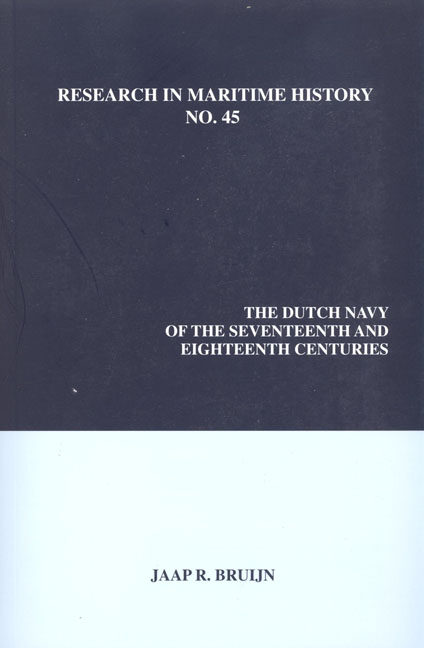Book contents
- Frontmatter
- Contents
- Illustrations
- Tables
- Series Editor's Foreword
- About the Author
- Introduction to the 2011 Edition
- Foreword
- Preface
- Introduction
- Map of the Dutch Republic
- Map of Dutch Naval Activity in European Waters
- Part One The “Old” Navy, Late 1500s-1652
- Part Two The “New” Navy, 1652-1713
- Part Three A Second-Rate Navy, 1714-1795
- Convoys and the Containment of the Barbary Corsairs
- Favouritism and Innovation
- Little Work, But More Education for the Naval Officer
- Naval Seaman, A Poor Man's Job
- Aftermath
- In Retrospect
- Bibliography
- Index
Favouritism and Innovation
from Part Three - A Second-Rate Navy, 1714-1795
- Frontmatter
- Contents
- Illustrations
- Tables
- Series Editor's Foreword
- About the Author
- Introduction to the 2011 Edition
- Foreword
- Preface
- Introduction
- Map of the Dutch Republic
- Map of Dutch Naval Activity in European Waters
- Part One The “Old” Navy, Late 1500s-1652
- Part Two The “New” Navy, 1652-1713
- Part Three A Second-Rate Navy, 1714-1795
- Convoys and the Containment of the Barbary Corsairs
- Favouritism and Innovation
- Little Work, But More Education for the Naval Officer
- Naval Seaman, A Poor Man's Job
- Aftermath
- In Retrospect
- Bibliography
- Index
Summary
The student of eighteenth-century Dutch history will be familiar with the fact of corruption and other malpractices in governing and administrative bodies at all levels. The admiralties were no exception. While one will remember that these elements were not new - diverse examples from the seventeenth century have been given in previous chapters of this study - the overall situation in the eighteenth century was significantly different. In the preceding period, such cases had been well publicized, exposure that helped make an immediate repetition of those malpractices rather unlikely. And certainly the naval part of the admiralty administration was then under regular pressure to operate as efficiently and smoothly as possible. But such pressure disappeared after the War of the Spanish Succession. Urgent naval matters very rarely arose anymore. A naval dockyard or the pay office never had to work under the pressure of great equipping or building programs. Indeed, the word “speed” seems not to have existed in an eighteenthcentury admiralty's vocabulary. Operating within this newly relaxed atmosphere, most people were disinclined to expose malpractices, and those who did received little attention.
The operation of the admiralty at Amsterdam during the first half of the eighteenth century has been studied in some detail. The composition of the board of that most important admiralty remained as it had been during the seventeenth century. Half of the twelve councillors represented the nobility of Holland and five cities in that province; the other half came from the remaining provinces. A decision required the vote of at least one of the non-Holland councillors. The Holland members of the board operated as a bloc, and the other members were never able to mount a credible opposition. This made the position of most non-Holland councillors rather superfluous, apart from one or two needed for their vote. These were usually the representatives of the provinces of Utrecht, Zeeland or Gelderland. The others rarely attended the meetings. Most members from Friesland, Groningen and Overijssel travelled to Amsterdam only the week they were officially installed in office and the week they took their leave. They automatically received the annual remunerations - from 2000 to 2500 guilders - no matter how little energy and time they had spent in office. Their terms were very short, lasting no longer than one or two years. Little can be said about the colourless representatives of Zeeland.
- Type
- Chapter
- Information
- The Dutch Navy of the Seventeenth and Eighteenth Centuries , pp. 141 - 152Publisher: Liverpool University PressPrint publication year: 2011



